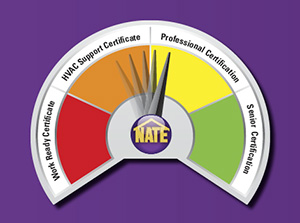RSI is a Great Training Option for Everyone
Learn more about how we can prepare you to advance your career.
North American Technician Excellence (NATE) recently added some new tests to its already robust certification program. 1 One of them is an HVAC Support Technician certificate and is available to HVAC technicians who have been working in the field for 6 to 12 months. While NATE already offers a number of well known certification options with many benefits to those who earn them, this new certificate is part of a new tiered structure. HVAC techs can gain professional credentials now at different levels, whereas before the only options were master-level certification exams.
Some HVACR schools like the Refrigeration School offer a NATE Certification Exam Preparation Course, which is approved by NATE as a Recognized Training Provider and testing facility. Studying for NATE exams with the support of a vocational school can provide resources that you might not otherwise have on your own.
HVAC Support Technician Certificate

The HVAC Support Technician Certificate covers many of the same topics as NATE’s other professional certificates but as a more fundamental skill level, making it possible to receive an official NATE credential sooner rather than later. If you pass this HVAC Support Technician exam, you receive a certificate (not certification). If you are trying to decide if taking the exam is a good idea or not, here are some considerations.
What’s On the Exam?
According to NATE, the HVAC Support Technician exam covers the following areas: 2
Get Started on the Path to a New Career
Fill out our form to learn how we can help you change your life.
- Safety
- Tools
- Basic science
- Basic electrical
- Installation
- Planned maintenance
- System components
- Design considerations
Are Taking these Exams Necessary?
While a NATE HVAC Support Technician Certificate is not required for employment, it is an option to consider to advance your opportunities and increase your qualifications. NATE is the leading HVAC certification program in the United States and has the support of the entire HVACR industry. 3 Adding these additional credentials will enhance your HVAC education. NATE credentialing also shows potential employers that you are committed to the trade because you have gone above and beyond to increase your knowledge. It is also a plus when it comes to working with customers, as research shows that consumers prefer certified technicians over uncertified ones. 4
When Should I Take the HVAC Support Technician Exam?
General Timeline:
- If you already have HVAC training from a vocational institution, you should be eligible for entry-level employment.
- After 6 months, you are eligible to take the HVAC Support exam.
- Then, after two years of working in the field, you’ll be eligible for NATE Professional Level Certification, which can increase opportunities in the field, particularly because they allow for greater specialization.
Before that time, if you are investing in gaining qualifications in addition to work experience, the NATE Support Certificate could be a great credential to add to your resume. It can help you reinforce your skills, it shows employers that you are dedicated to the field, and it familiarizes you with NATE testing procedures. Consider what it will requires of you in terms of time, money, and commitment, and whether the rewards are worth investing in. Taking and passing the exam certainly won’t hurt your HVAC career!
Additional Sources
1 – http://natex.org/site/430/Technicians/What-Tests-to-Take/KATEs/HVAC-Support-Test
2 – http://www.natex.org/Portals/_Appleseed/images/default/HVAC%20Support%20KATE.pdf
3 – http://www.natex.org/site/386/About-Us/What-is-NATE
4 – http://www.natex.org/wp-content/uploads/2011/09/final-proof.pdf
This blog has been labeled as archived as it may no longer contain the most up-to-date data. For a list of all current blog posts, please visit our blog homepage at https://www.rsi.edu/blog/




